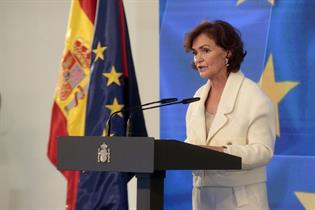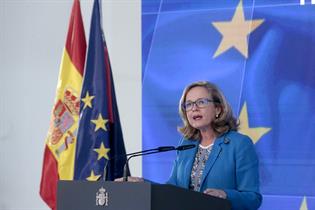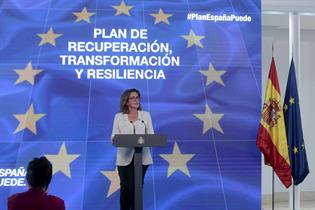At joint event with the four Vice-Presidencies of the Governmen
Government outlines four main pillars of Recovery and Resilience Plan
News - 2020.10.7
Following the introduction on Wednesday morning of the main lines of the Plan by the President of the Government, the four vice-presidents of the government outlined, at a joint event, the development of the policies that correspond to their ministerial portfolios to structure the close to 72 billion euros allocated for the period 2021-2023.
Spain can and must do so
"Spain can and must do so and there is no alternative to doing it well", stated the First Vice-President of the Government, Carmen Calvo, in relation to the necessary modifications that the State must make to provide an effective response to exiting the social and economic crisis caused by the pandemic.
 Pool Moncloa / JM CuadradoFor Carmen Calvo, the next few years will be a major challenge for institutions, for the political leaders of all the public authorities and also for the private sector, which must rise to the level shown by the Spanish people over recent months since the start of the pandemic.
Pool Moncloa / JM CuadradoFor Carmen Calvo, the next few years will be a major challenge for institutions, for the political leaders of all the public authorities and also for the private sector, which must rise to the level shown by the Spanish people over recent months since the start of the pandemic.
"Crises bring change and changes can bring opportunities for progress", she remarked, in relation to the need to implement all the outstanding transformations at this time to lay the foundations for the future. "We must coordinate and improve our co-governance to become more effective", stated Carmen Calvo, indicating that by doing this we will manage to involve all parties and generate synergies for recovery with the private sectors.
For the First Vice-President of the Government, the approval of the National Budget "where the roadmap coincides with the reality" also requires a far-reaching modernisation of Central Government through structural modifications that were already necessary before but which have now become essential.
"Our regulatory plan provides for a new Public Administration Act, which simplifies our procedures without undermining rigour, control and transparency".
Carmen Calvo explained the need to undertake reforms to assimilate the European funds quickly and effectively through a Royal Decree due to the urgency stemming from the COVID-19 crisis, but not without their passage as laws through Parliament, so that these changes can be enriched and improved by the different parliamentary groups.
Lastly, the First Vice-President of the Government listed some of the laws that need amending, such as the State Contracts Act, the Public Sector Legal System Act, the Budget Act and the Public Subsidies Act, remarking that these changes will be made so that "we must be both guarantors and efficient".
An unprecedented opportunity
Pablo Iglesias, the Second Vice-President of the Government and Minister for Social Rights and the 2030 Agenda, underlined the opportunity offered by the European agreement to overcome the weaknesses in our economy that have been highlighted by recent crises, such as job insecurity, the high level of child poverty and the undiversified productive model, together with the lack of public investment in health, education and social protection.
"For Spain, this is an unprecedented opportunity to correct the deficiencies in the economic structure of our country", underlined the Second Vice-President of the Government.
 Pool Moncloa / JM CuadradoThis change of structure is essential to comply with the Sustainable Development Goals and the 2030 Agenda to ensure we have the foundations to comply with the goals over the next nine years. In this regard, Pablo Iglesias set out the goals to be met.
Pool Moncloa / JM CuadradoThis change of structure is essential to comply with the Sustainable Development Goals and the 2030 Agenda to ensure we have the foundations to comply with the goals over the next nine years. In this regard, Pablo Iglesias set out the goals to be met.
Firstly, to re-industrialise our country with criteria for the ecological transformation, committing to renewable energies that could give us a competitive edge. Secondly, economic diversification. "No-one should forget the corruption that has harmed Spain so badly had an economic basis", he decried. "We need new entrepreneurs that take on the leadership of a business sector that is able to build new challenges that will define our country in the coming years", he urged. And the third goal is to strengthen the public authorities. "We must invest more in public health. We cannot allow our healthcare professionals to work every day under unacceptable conditions".
Pablo Iglesias highlighted the need to improve the care system. "Investment in care responds to social justice and economic efficacy". He explained that, with a care system similar to the one in Sweden, Spain could create half a million jobs. He also estimated that to establish a public education system from birth would result in the creation of 150,000 jobs.
A digital Spain
 Pool Moncloa /JM CuadradoThe introduction of the "Recovery, Transformation and Resilience of the Spanish Economy Plan" could raise growth by between two and three percentage points in 2021 and allow a return to the pre-COVID path of growth by the end of 2023.
Pool Moncloa /JM CuadradoThe introduction of the "Recovery, Transformation and Resilience of the Spanish Economy Plan" could raise growth by between two and three percentage points in 2021 and allow a return to the pre-COVID path of growth by the end of 2023.
The Third Vice-President of the Government and Minister for Economic Affairs and Digital Transformation, Nadia Calviño, explained that in order to achieve these goals, it is crucial to undertake a modernisation process of our productive structure in which the digital transformation becomes an essential process.
This digital transformation will have a budget of some 20 billion euros, equivalent to 33% of the planned investment through transfers for the period 2021-2023.
The projects related to digitalisation will be deployed through 10 guiding policies that range from the urban agenda to education, from agriculture to tourism, from industry to mobility, from the modernisation of the public authorities to the new care economy, with the aim of harnessing this opportunity to push through the digital transformation that acts on infrastructures and technology, on economic sectors and the productive fabric and on people.
The 10 strategic goals of the Digital Spain 2025 agenda, presented by the government back in June will be the path to follow in the digitalisation process that will now be speeded up by the Recovery Plan for the Transformation of the Spanish Economy.
An ecological transition full of opportunities
 Pool Moncloa / JM CuadradoThe Fourth Vice-President of the Government and Minister for the Ecological Transition and Demographic Challenge, Teresa Ribera, remarked that the urban and rural agenda, the development of resilient infrastructures and eco-systems and the just and inclusive energy transition are the three main driving policies that will condition the actions of her department.
Pool Moncloa / JM CuadradoThe Fourth Vice-President of the Government and Minister for the Ecological Transition and Demographic Challenge, Teresa Ribera, remarked that the urban and rural agenda, the development of resilient infrastructures and eco-systems and the just and inclusive energy transition are the three main driving policies that will condition the actions of her department.
These pillars, together with the cross-cutting approach of the demographic challenge, constitute, in her opinion, "an opportunity to transform the country and modernise the economy". "This plan we present today activates and mobilises investments with a knock-on effect on the economy and job creation, investments that forge competitiveness, modernise the productive fabric and allow us to focus on strategic sectors for the country", stated Teresa Ribera.
As regards the urban and rural agenda, which will be allocated 16% of the resources, the government is committed to sustainable mobility, to boosting electrification and the renewal of the pool of vehicles, the energy rehabilitation of the buildings and the transformation and digitalisation of the logistics chain of the agri-food system as fundamental actions, goals that will be allocated funding of 5 billion euros over the next three years".
In terms of the development of resilient infrastructures and ecosystems, an Ecological Restoration Fund will be set up to push through the green transition and protect biodiversity. In this regard, the Fourth Vice-President of the Government highlighted that work will be done "on forests and the prevention of wildfires, and on the restoration of at least 10,000 hectares of wetlands". Improving the management of water resources, through the rehabilitation of 3,000 kilometres of rivers, and the adaptation of the coastline to climate change, with the recovery of at least 200 kilometres of coastline, are other actions in this field.
The energy transition, which is the third of the guiding principles, and accounts for 9% of the Plan's resources, seeks to move towards a system that is 100% renewable, open to citizens, companies and public authorities. To achieve this, progress will be made on a clear, stable and predictable regulatory framework that stimulates private investment in the rollout of renewable energies through a new system of auctions and lines of support for innovative projects, with a clear commitment to floating offshore wind farms.
The commitment to renewable hydrogen as a country project - key for the economic reactivation and to achieving climate neutrality - and the National Self-Consumption Strategy are a couple of the policies under this pillar, which assigns great importance to dialogue, and to supporting and accompanying the reactivation of the areas most affected by this ecological transition, which must be just and inclusive, addressing the demographic challenge in a cross-cutting and priority fashion.
The Fourth Vice-President of the Government also highlighted the economic benefits of the circular economy, which generates investments with a major impact on economic activity and job creation, with a potential for an additional 0.5% of GDP per annum. Addressing the fight against rural depopulation is one of the main priorities and accounts for 17% of the Plan. In order to reverse the trend of decades of depopulation and ageing in rural areas, "we will begin in municipalities with less than 5,000 inhabitants, disbursing 12 billion euros in three years in building efficiency, water purification, digital connectivity and connected education". A boost will also be given to sustainable tourism, with special focus on quality, both in rural and mountainous areas as mature tourist destinations.
Non official translation




